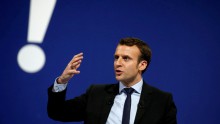The presidential election campaign in France took a rather unexpected turn. Until recently, all the polls had predicted a second round victory for the conservative “Kremlin’s candidate” Francois Fillon over the leader of the National Front Marine Le Pen.
And now it turns out that an independent candidate Emmanuel Macron has quite suddenly become the favorite for this presidential election. According to the polls published by Elabe commissioned by Les Echos and Radio Classique, the 39-year-old politician might enjoy a victory over Le Pen in the second round of elections on May 7, gathering the support of 65 percent of the electorate. At the same time, the first round on April 23 will get 23 percent for Macron, 27 percent for Le Pen, and 20 percent for Fillon. And thus Fillon, who had had the rating of 26 percent earlier, risks being left out of the second round.
Interestingly, the survey was conducted even before the recent revelations about the “Fillongate” – the scandal around the candidate’s wife Penelope Fillon, who received taxpayers’ money for fake work. According to the newspaper Le Canard Enchaine, she received 831,000 euros from the state for the work she did not perform. At the same time, there is no evidence that she really worked there, the publication follows. Fillon told the media that the work was indeed done, but the prosecutor’s office launched an investigation and has already questioned the couple. This scandal is so serious that several of deputies of the center-right Republican Party have called for Fillon to withdraw from the presidential race.
WHO IS MACRON
39-year-old Macron, dubbed the rising star of French politics, began his career as an investment banker and later served as an adviser to the incumbent President of France Francois Hollande. In 2014 he was appointed minister of economy in the second socialist government, which was headed by Manuel Valls. On the backdrop of protests against labor reform and in connection with his emergent presidential ambitions, he resigned in August 2016. Before that, in April, Macron created a political organization En Marche (“Forward!”). One of the actions by En Marche was related to voters’ complaints about the state of affairs in the country. In July, the Minister delivered a speech in which he promised to lead the movement “to 2017 and to victory.” Emmanuel Macron is known for his left-liberal views. In the government he was distinguished by the policy aimed at market deregulation.
“THE FRENCH SOCIETY HAS THE DEMAND FOR RENEWAL AND REJUVENATION OF THE POLITICAL CLASS”
Tatiana KASTOUEVA-JEAN, head of the Russia/NIS Center at French Institute of International Relations:
“Macron is an interesting figure; his approval rating did not depend on the ‘Fillongate,’ but that scandal can indeed contribute to the strengthening of his position, as other candidates are either not convincing enough (Benoit Amon to the right), or too extreme up to the point of rejection (far-left Melenchon or far-right Le Pen). He took an in-between niche between the left, having quit the leftist government, and the right, creating his own movement. His program is really unknown; he did not participate in any primaries and did not defend it in debates with other candidates. The details of his stance on Russia and Ukraine are also unknown, but, in any case, it seems distant from those of Le Pen and Fillon.
“He may find himself attractive to several categories of the electorate, as he belongs to the establishment and boasts the educational background, which is very typical of the French elite (Higher School of Administration, Institute of Political Science, job at the Finance Inspectorate), while also being a ‘frondeur’ who retired from the government. He can attract businesses because he knows the business and has been a banker himself.
“Even the female electorate may be impressed with the fact that his wife is much older than him and they live with her three children from her first marriage. In general, Macron is an unexpected figure who has a chance in this election in the light of what’s happening in France, starting with a surprise on the rightists’ primaries. In any case, his electoral rallies gather huge attendance. And the considerable funds raised for the campaign, more than those of Fillon and Juppe, show that he enjoys much support in serious circles. Anyone who is acquainted with him speaks of his brilliant intellect. The centrist niche, even if he does not like the term himself, can play to his advantage. The French are noticeably tired of the hackneyed splits between the right and the left and can welcome a new person whose reputation is not tarnished by any major scandals – at least not yet. The French society has the demand for renewal and rejuvenation of the political class.”








